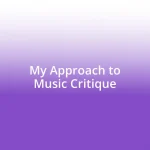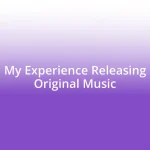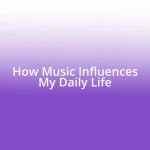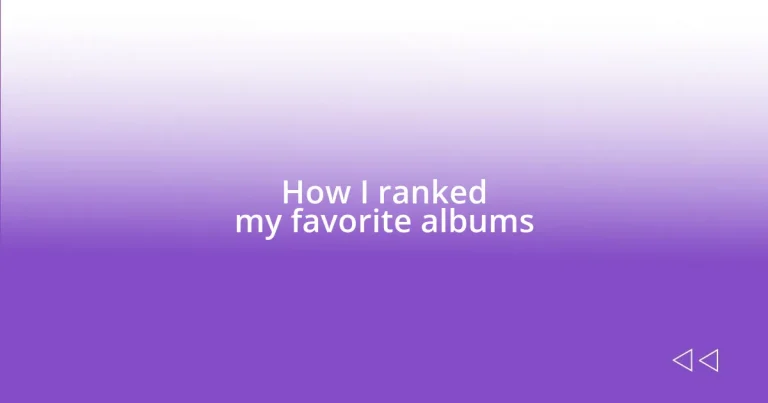Key takeaways:
- Choosing favorite albums is a personal journey shaped by emotions, memories, and life experiences.
- Criteria for ranking albums include emotional connection, innovation, cohesion, lyricism, and cultural impact.
- Nostalgia significantly influences album rankings, as certain records serve as soundtracks to pivotal life moments.
- Engaging with others online enhances the music experience, fostering discussions and introducing new perspectives on albums.
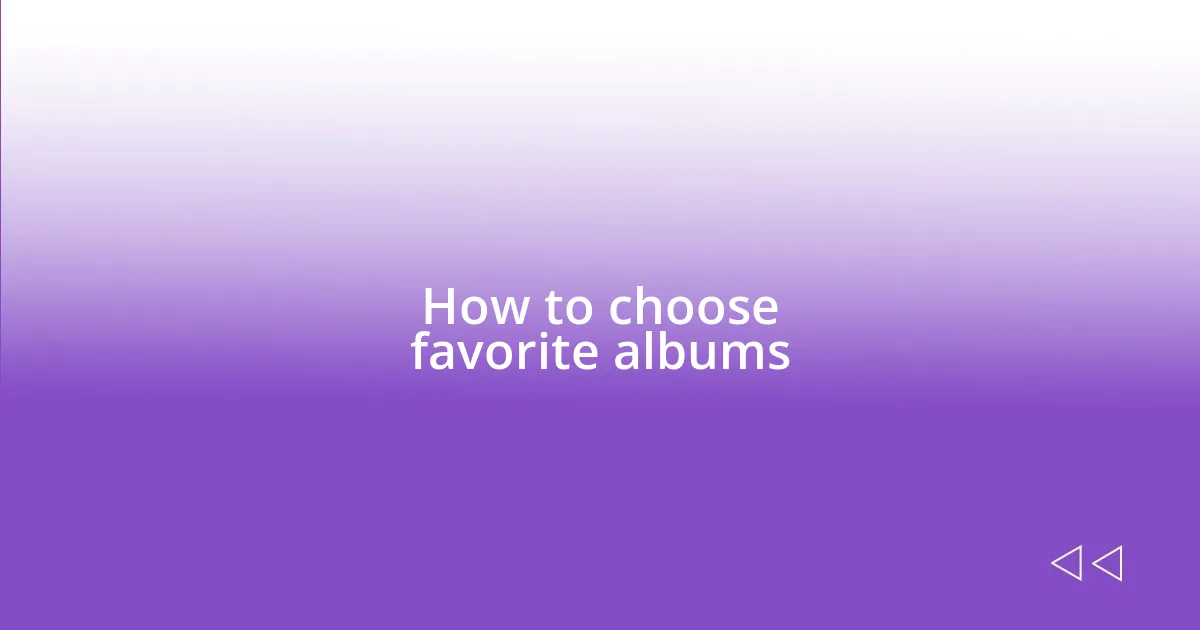
How to choose favorite albums
Choosing your favorite albums can be a deeply personal experience, rooted in memories, emotions, and even the comfort of nostalgia. I remember the exact moment I first listened to Dark Side of the Moon—it was a rainy afternoon, and the music enveloped me like a warm blanket. How do certain songs evoke such vivid images or feelings? It’s often about the connections they help us forge, both with ourselves and with those around us.
When I consider which albums to include in my favorite list, I think about how they resonate with different chapters of my life. An album might remind me of summer adventures or a tough time when I needed a particular song’s message. I often ask myself, which albums still speak to me, no matter the mood or situation? This reflective approach ensures that my favorites are timeless treasures that continue to inspire and comfort me.
Don’t forget to reflect on how the music makes you feel! I’ve found that sometimes it’s not just about the lyrics or melody, but the overall vibe an album conveys. Can a specific track lift your spirits when you’re down or bring tears to your eyes in joy? Those emotional connections can be powerful indicators of which albums truly deserve a spot in your personal hall of fame.
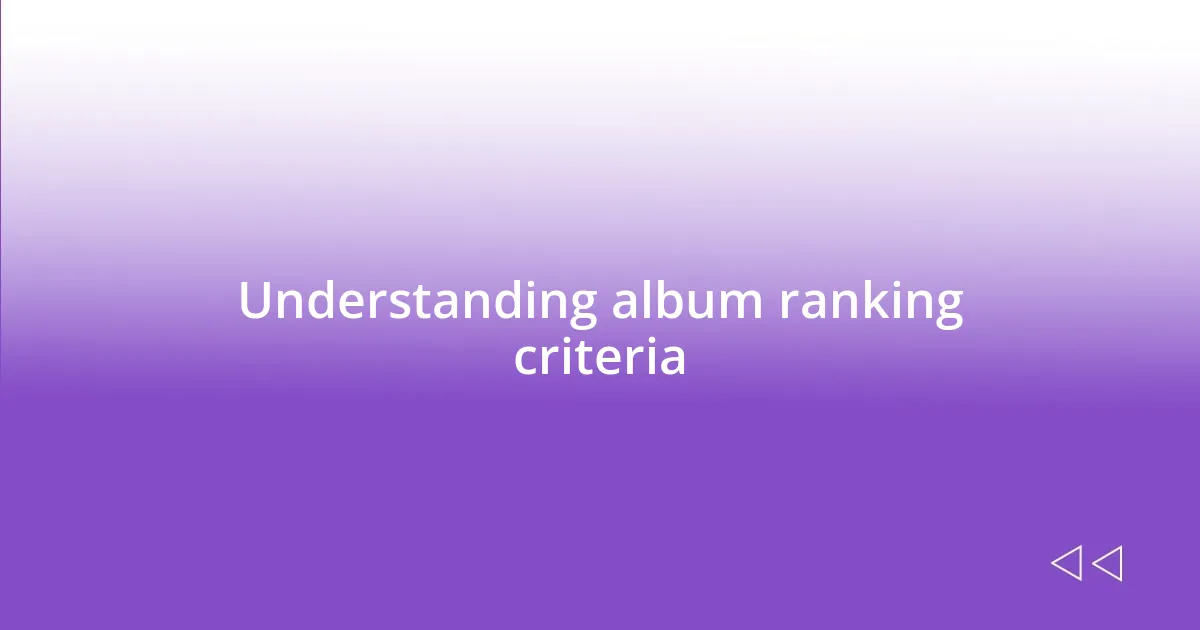
Understanding album ranking criteria
When I rank my favorite albums, I consider several criteria that reflect both the quality of the music and its personal significance. I think about the artist’s intention and how well they executed their vision. Sometimes, an album’s coherent storytelling or unique sound will leave a lasting impression on me, making it stand out from the rest.
Here’s a shortlist of the criteria I often weigh in my rankings:
– Emotional Connection: How deeply does it resonate with my own experiences?
– Innovation: Does the album introduce new sounds or styles that push boundaries?
– Cohesion: How well do the tracks work together as a whole?
– Lyricism: Are the lyrics impactful, thought-provoking, or relatable?
– Cultural Impact: Has it influenced the music scene or sparked meaningful conversations?
In some cases, I also find myself drawn to how certain albums capture a specific time and place in my life. For example, when I listen to Rumours by Fleetwood Mac, I am instantly transported back to my high school days, clad in oversized sweaters with friends in the parking lot at dusk. That album was the backdrop to countless memories, reinforcing its place on my list despite not always being my typical genre. Each criterion interweaves with personal narratives, shaping my musical landscape in profound ways.
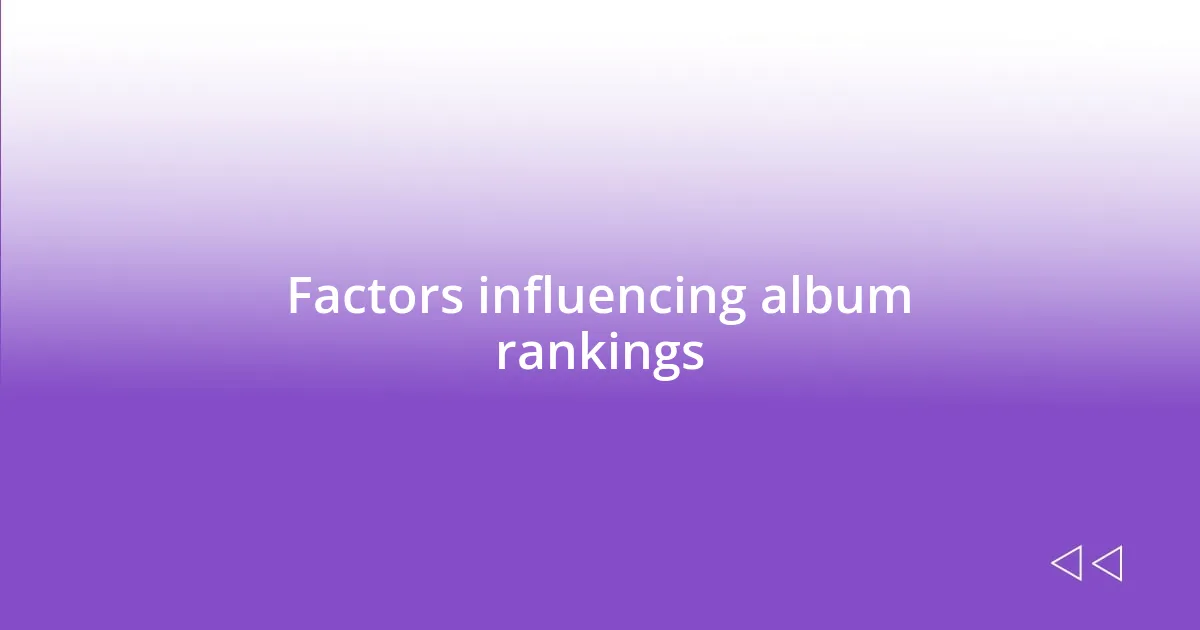
Factors influencing album rankings
The factors I consider when ranking albums are often a mixture of subjective and objective criteria. For instance, I vividly recall the first time I played OK Computer by Radiohead; it felt like a sonic awakening. Albums that provoke thought or elicit an emotional response tend to hold a special place in my heart, influencing their rank in my list.
Additionally, I can’t ignore the nostalgia factor. I remember the summertime road trips where we belted out The Joshua Tree by U2, the wind in our hair and those carefree moments etched in my mind. This emotional tie can significantly elevate an album’s status for me, regardless of its critical acclaim. I think it’s fascinating how certain albums can serve as soundtracks to pivotal moments in our lives, shaping not just our tastes in music but also our personal narratives.
Finally, I also evaluate the cultural significance of an album. When To Pimp a Butterfly by Kendrick Lamar dropped, it felt like a monumental moment in music history, challenging social norms and sparking conversations. How an artist uses their platform to express meaningful messages impacts their place in my ranking. It’s this blend of emotional resonance, personal experiences, and broader cultural narratives that truly define my rankings.
| Factor | Description |
|---|---|
| Emotional Connection | Resonance with personal experiences or memories. |
| Nostalgia | Emotional ties to significant moments in life. |
| Cultural Impact | Influence of the album on society and conversations. |

Creating a personal ranking system
Creating a personal ranking system is much more than just listing albums based on preference; it’s a deep dive into my personal journey with music. I often find myself asking, “What moments did this album shape in my life?” For instance, the raw energy of Nevermind by Nirvana reminds me of late-night talks with friends, where we found solace in shared angst. Those connections can elevate a record beyond mere melodies to something profoundly meaningful.
Another essential aspect of my ranking process is how I assess innovation in music. I remember the first time I heard Dark Side of the Moon. It was like opening a door to a new dimension. That album didn’t just influence my taste; it transformed how I perceived the possibilities within music. When crafting my ranking system, I ask what new ideas the album introduces and how it challenges the status quo. Does it offer a fresh perspective that lingers long after the last note fades? If yes, it deserves a spot higher on my list.
Lastly, I can’t underestimate how the album’s overall cohesion sweeps me up into an immersive experience. For instance, I often think about A Moon Shaped Pool by Radiohead, where each track flows into the next, creating a hauntingly beautiful journey. I ask myself: does it take me somewhere spiritually or emotionally? An album that makes me feel like I’m part of its world invariably ranks higher, as it suggests that the artist’s vision was successfully realized. In this dance between personal resonance and artistic expression, I find my ranking system takes shape, blending both heart and intellect.
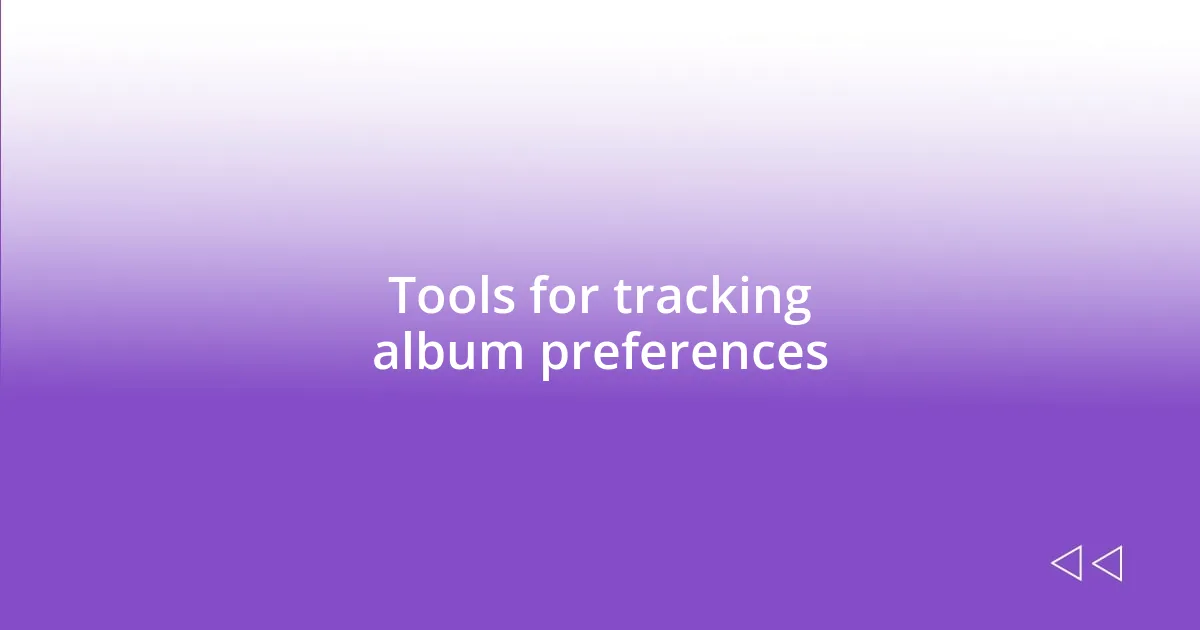
Tools for tracking album preferences
Tracking album preferences has become an engaging hobby of mine over the years, and I’ve tried several tools to streamline the process. I’ve found platforms like Discogs particularly useful for cataloging albums; the thrill of creating a virtual collection and seeing my favorites in one place is genuinely satisfying. Plus, the ability to connect with other music lovers and discover hidden gems makes the experience even more enriching.
On a more interactive note, I often use apps like Spotify or Last.fm to monitor my listening habits. They provide insights into what I play repeatedly, which helps me identify which albums genuinely resonate with me. Have you ever thought about how your daily listening might influence your rankings? I recall a time when I couldn’t stop playing Rumours by Fleetwood Mac. It subtly moved up my list, not just for its nostalgic sound but because it became the backdrop for a cozy corner of my life.
Lastly, I love utilizing spreadsheets to create detailed rankings and notes about each album. It might sound a bit nerdy, but it’s my way of digging deeper into music analysis. When I look back at my notes on Abbey Road, I can reflect on why certain songs hit me so hard during specific life moments. Isn’t it intriguing how a simple column of numbers can encapsulate an emotional journey? This personal archiving not only tracks preferences but also allows me to revisit memories connected to the music, making it all the more special.
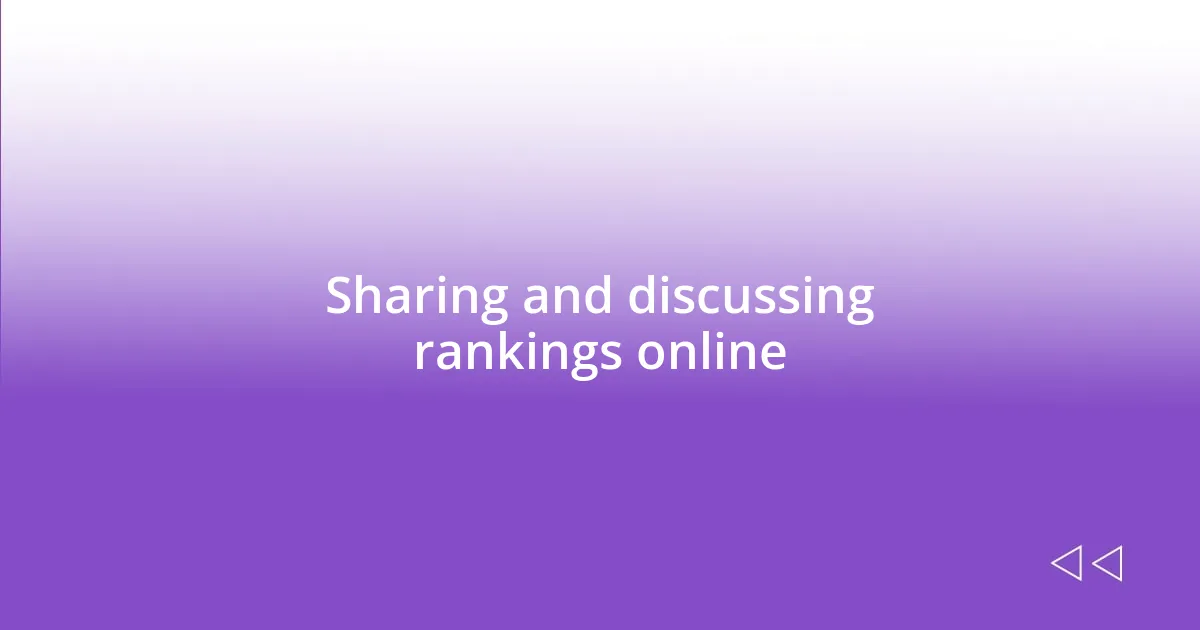
Sharing and discussing rankings online
It’s fascinating how sharing album rankings online can spark lively discussions and deepen my appreciation for music. I’ve experienced moments where a simple tweet about my favorite albums led to an unexpected exchange of thoughts with fellow music fans. One time, I shared my enthusiasm for OK Computer by Radiohead, and a reader had a completely different interpretation of its themes. It made me realize that music is not just personal; it’s a shared experience that can lead to enlightening conversations.
Engaging with others online also allows me to discover hidden gems I might have overlooked. I vividly recall a Reddit thread where users ranked their favorite 90s albums. Someone mentioned The Miseducation of Lauryn Hill, an album I had always respected but never fully explored. After engaging with their insight and revisiting the album, it transformed my perspective entirely, emphasizing the importance of dialogue in enriching our musical journeys. Have you ever stumbled across a recommendation that completely altered your listening experience?
In my experience, platforms like Instagram or music forums create unique communities where our rankings can resonate with others. Each post or comment can touch on personal stories, like how a particular album played during a significant life moment. I remember posting a ranking that included The Life of Pablo by Kanye West, and several followers chimed in about the impact it had on them during tough times. It’s this sense of camaraderie and shared emotion that turns a simple ranking into a collective exploration of art and memory, allowing us to appreciate music on deeper levels than we imagined.
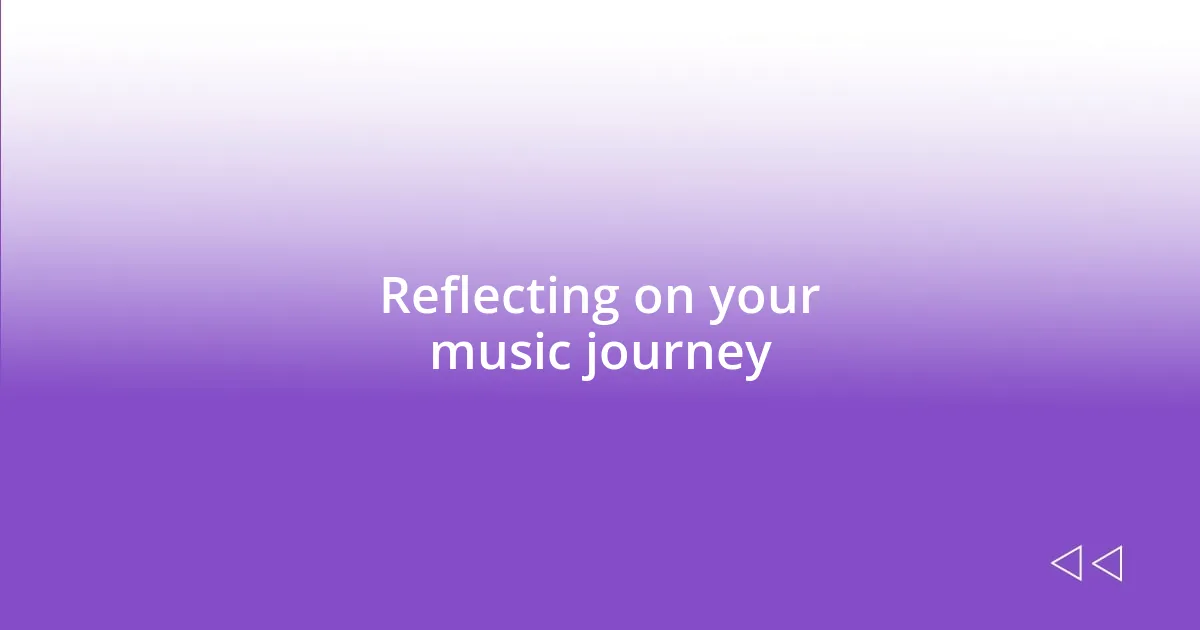
Reflecting on your music journey
Reflecting on my music journey often reminds me of where I started and how far I’ve come. I remember listening to Nevermind by Nirvana as a teenager, feeling like it spoke to my chaotic emotions. Can a simple album truly encapsulate a period of one’s life? For me, that album opened doors to new genres and perspectives, shaping my musical taste profoundly.
As I think back on my journey, certain albums stand out not just for their sounds but for the memories they conjure up. I can still vividly recall road trips where The Suburbs by Arcade Fire was the soundtrack, weaving in and out of conversations and laughter with friends. Isn’t it remarkable how music can solidify moments in time? Those songs weren’t just background noise; they became part of my narrative, almost like chapters in a book.
In reflecting on my evolving tastes, I can see how each album has contributed to my personal identity. There was a time when Lemonade by Beyoncé felt like a revelation, pushing me to think critically about art and its connection to culture. How do our favorite albums reflect who we are at different stages of life? For me, revisiting these milestones is a journey of self-discovery, reminding me that my preferences tell a story of growth and resilience.



